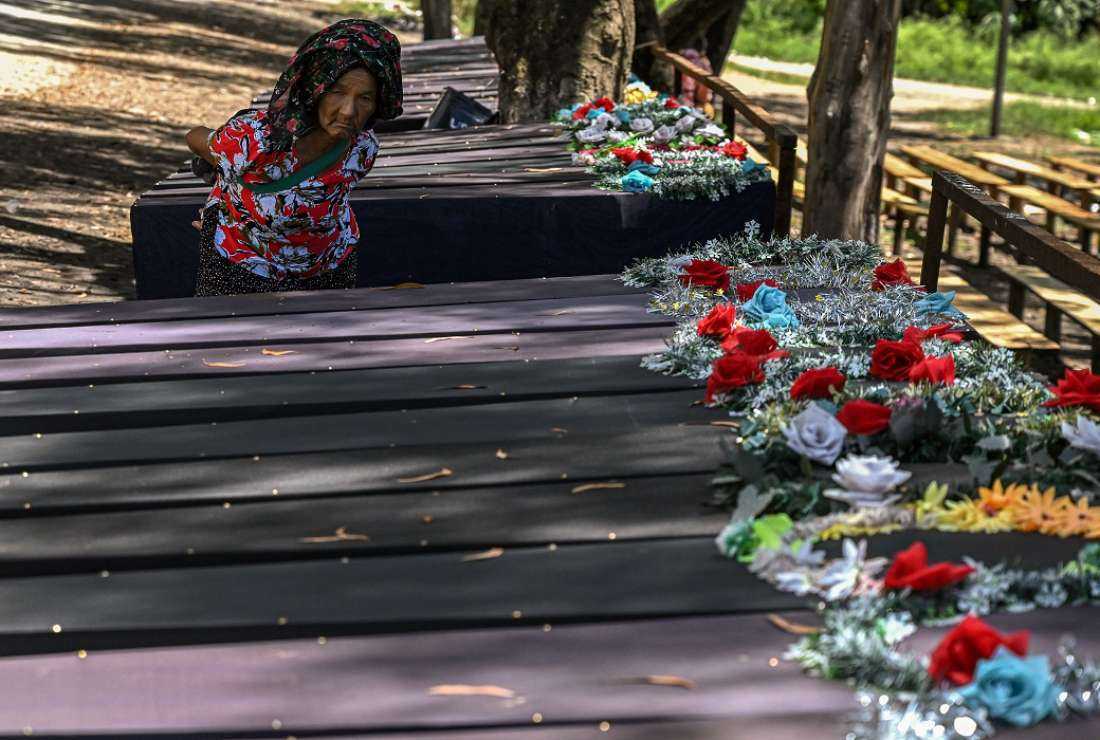
In this picture taken on July 24, 2023, an elderly woman looks at empty coffins kept at a makeshift memorial made for the victims who lost their lives during the ethnic violence in Churachandpur district in the northeastern Indian state of Manipur. (Photo: AFP)
The top court in India’s strife-torn Manipur has halted plans for a mass burial of tribal Christians killed in sectarian violence that has gripped the northeastern state for more than three months.
Manipur's High Court on Aug. 3 told Kuki tribal Christians to call off the mass burial of 35 people who died in clashes between them and the majority Meitei Hindus, which has so far claimed 181 lives, mostly Christians.
The court also asked to wait for a definitive ruling on the matter at a hearing scheduled for Aug. 9.
The move was in response to a petition by International Meitei Forum, which said the land for the proposed Christian burial belonged to the Meitei community. The Kuki people were preparing the burial ground in Torbung Bangla in the Bishnupur district, about 55 kilometers from the state capital Imphal. The court rushed the order after the state government, headed by the pro-Hindu party of Indian Prime Minister Narendra Modi, told Manipur's Chief Justice M V Muralidaran that the dispute on mass burial could cause further violence.The court order asked the state and federal governments "as well as the public belonging to both the communities...to maintain status quo ante of the land in question till next date" of hearing.
K. Lalboi Neihsial, general secretary of the All-Manipur Tribal Union, told UCA News on Aug. 3 that they have called off the planned mass burial following opposition from Meiteis.
“We have been trying to bury our people and pay them our last respects,” he said.
The 35 bodies were of people killed in Churachandpur district, where the riots started on May 3 following a solidarity march by tribal students. The bodies are kept in the government morgue.
Neihsial said the union has no details on people killed in other parts of the state, home to 3.2 million people, some 40 percent of whom are Hindus who live mainly in the valleys of the hilly state, that borders civil war-hit Myanmar.
Armed with a court order, the Meitei community is seeking tribal status to gain benefits under India’s affirmative action policy that reserves for the most socially disadvantaged groups government jobs and places in educational institutions and on elected bodies such as parliament and state assemblies.
The Kukis oppose the move, alleging the already prosperous Meiteis will buy their land to uproot them from the state's hilly regions.
Already, more than 50,000 people, mostly Christians, have been declared displaced. Some of them remain in the forests.
Church sources said the death toll could be much higher and will have to wait until people returned to their respective villages.
“We don’t know how many bodies are in the morgues,” Neihsial said.
We have requested police to deliver the bodies to us from Imphal, but “there was no response,” he added.
India’s Supreme Court on Aug. 1 asked the government to identify unclaimed bodies in morgues after tribal groups alleged mistreatment.
Advocate Tushar Mehata, representing the Manipur government, however, said most of the unclaimed bodies were “those of infiltrators."
Regarding the burial dispute, on Aug. 1, the Coordination Committee on Manipur Integrity (COCOMI), which also represents the Meitei community, said the burials should be performed in the home villages of the deceased as was done for Meitei victims of the violence.
"Burying the bodies together in a newly created mass grave on the land of a Meitei village will not only provoke the sentiments of people on both sides but will also remain a symbol of enmity," the COCMI said in a statement.
The Indigenous Tribal Leaders' Forum, which initially proposed the mass burial has decided to wait until the High Court rules on the matter at the scheduled hearing on Aug. 9.
In the meantime, the 35 bodies will remain in a morgue until a decision is reached.


